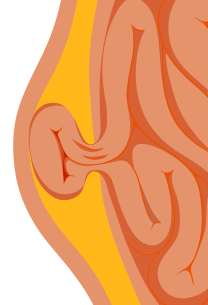More than five million people in the U.S. are living with a hernia and about 30% of adults will develop a hernia during their lifetime. It is estimated that thousands of people avoid seeking help for a hernia because they fear a painful, long recovery. However, hernia specialists trained in minimally invasive techniques can make hernia treatment relatively quick and painless.
What is a hernia?
A hernia is a small sac of tissue that protrudes through an opening in various parts of the body. There are many types of hernias:
 An inguinal hernia occurs in the stomach wall near the groin. These are the most common type of hernia.
An inguinal hernia occurs in the stomach wall near the groin. These are the most common type of hernia.- A ventral hernia occurs in a weakened area of the abdominal wall.
- A femoral hernia occurs in the area between the abdomen and the thigh. These often result from pregnancy and childbirth.
- An incisional hernia occurs in a weakness created by a previous surgery. These can develop right after or years after a surgery.
- An umbilical hernia can occur in the naturally weakened area of the navel where the umbilical cord was attached.
How can I avoid a hernia?
Anything that puts pressure on the muscles–obesity, heavy lifting, strenuous sports, straining during bowel movements, even prolonged bouts of coughing or sneezing–can result in a hernia. A healthy diet and core strength training can help you avoid a hernia.
Why should I treat my hernia?
Many people overlook their hernia, figuring it will eventually go away. But this is a myth. Once you have a hernia, it’s there forever, until you have it repaired. If left untreated, hernias will increase in size and become more painful. Hernias should be evaluated and not ignored.
What are the risks of a hernia?
Untreated hernias can lead to bowel obstruction, which causes severe pain, vomiting, and the inability to pass a bowel movement. They can also lead to more lethal complications, such as intestinal strangulation, which requires emergency bowel resection and if not done quickly enough, can lead to sepsis and ultimately, death.
How can I treat my hernia?
Using new treatment options, some hernias can be repaired in less than an hour on an outpatient basis. Current techniques require only a small incision and local anesthesia.
These techniques use reinforcing mesh to provide strength and durability and have replaced traditional methods of suturing hernias, which have a high failure rate and result in more pain.
Not all surgeons are experienced in repairing hernias. Hernia specialists, like those at The Oregon Clinic, perform hundreds of hernia repairs each year and are trained in the most modern surgical techniques.